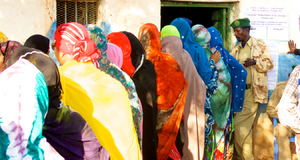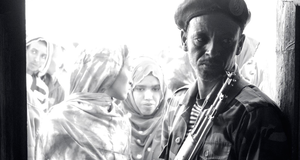Featured Article:Democracy Up Close in Somaliland: Reflections of an International Election Observer
By
2012, Vol. 4 No. 12 | pg. 3/3 | « Multiple voting was further facilitated by the use of trucks – probably organized by particular party organizations – to transport voters between polling stations. This activity was of course banned, with all roads inside Somaliland officially closed to vehicles without special National Election Commission plates. Because most polling stations in rural areas are separated by great distance, the intent of this rule is perfectly clear and if enforced would probably have a significant impact on reducing instances of multiple voting. However, the police and security forces lacked any real capacity to enforce this rule, particularly in rural areas. After standing around for fifteen minutes in a practically deserted polling station in the afternoon, we hear a commotion outside: looking out the window, I see a cargo truck packed with young men pulling into the station. As the truck comes to a dust-enshrouded halt, these newly materialized voters jump to the ground and queue up at the station, which has now changed from a lazy rural outpost to a frenzied mess of activity. Nada and I observe person after person turned away after having their fingers inspected. This is a good sign considering that unquestionably every one of these voters has already cast a ballot somewhere else. Nevertheless, at least half are allowed to vote. In a unique cultural twist, many suspect voters are asked to swear to god that they have not already voted – 'wallah.' In the Somali context, where the nation is effectively 100% Muslim, this is a surprisingly effective tactic! Caught red handed but unwilling to sacrifice their faith, disdained voters refuse to say the words and walk out defeated. From my impression of the November 2012 elections, multiple voting did not necessarily violate the integrity of the process in a way that would call into question the democratic nature of the outcome. Although the tenet of one-person one-vote seems a basic principle of the electoral process, the most important observation we made is that the phenomenon of multiple voting appeared to have a completely different meaning and significance in the Somaliland context. This is apparent in two ways: first, from the perspective of voters, who seemed not to be fully aware that voting more than once was in any way a bad thing. At one point in the days following the election, I was engaged in a brief conversation with a Somali man who, after learning my nationality, asked me if I voted for Barack Obama (who is naturally quite popular across Africa). After I answered in the affirmative, the man asked with total seriousness, "how many times?" When I told him "just once," he enthusiastically proclaimed that he had been able to vote five times for his candidate of choice! In fact, I had similar exchanges with a number of voters after asking them if they had voted, and all proudly and unabashedly indicated the number of times they had voted – usually more than once. In this sense, multiple voting can be viewed practically as an outgrowth of enthusiasm for the democratic process: this is indeed a positive takeaway from a phenomenon that might otherwise be viewed as fundamentally undemocratic. The second important consideration is that multiple voting, widespread as it was, did not appear – at least in any obvious way – to be dominated by one or a few parties. Rather, it seemed to be widely distributed, 'cheating' indeed but, as one other international observer put it, 'equal opportunity cheating.' So although in these elections there were no doubt more votes cast than individuals who voted, it still seems highly likely that the outcome of the election represents the general will of the people, which is ultimately the most important goal of any democratic process. (Although it should be noted that the results are currently disputed by representatives of several parties that did not meet the threshold for becoming official parties; these groups claim that multiple voting was in fact orchestrated by the party currently in power [Kulmiye]. No international observers that I spoke to made this assertion, nor did any make note of one-party dominated multiple voting.) Moreover, we did not witness more blatant forms of cheating such as ballot stuffing (although one IEO did report a ballot box being seized by the police). In this sense, the primary testament to Somaliland's democracy is that the population remains enthusiastic about the process. Although the process did break down in several ways – the not so indelible ink being the most important – the break down happened within the confines of a democratic system and, significantly, did not challenge this system in any fundamental way. While the process was imperfect, the outcome nevertheless represents further consolidation of a democratic norm. ___________________ After visiting approximately ten polling stations over the course of the day, we returned to Salaxley to observe the close of the polls and the counting process. As we waited around, we once again witnessed our 'interventionist' SPU agent involve himself in a conflagration. Over the day, we witnessed various incidents of tension and chaos outside polling stations, although this particular incident occurred on the outskirts of town and appeared to involve a dispute about whether or not someone would be allowed to get onto one of the trucks ferrying voters between towns. I watched from a distance as two men yelled at each other and soon thereafter began hitting each other. The younger man, after being accosted with a cane, boldly drew a large knife from his side and began wantonly swinging toward the other man. This inevitably drew a large crowd of loud onlookers, and our SPU agent marched into the fray gun in hand and finger-on-trigger. The crowd, led by this SPU, quickly subdued the man, tied him by the hands, forced him to his knees, and began beating him, though with some (minor) restraint. After a few minutes of this, the agent – for reasons totally unbeknownst to me – marched the man by the hands to our vehicle, stripped him of several other weapons, and somewhat to my surprise, set him on his way. The confrontation was over, our security guards and driver found it all quite funny, and that was that. Such is the way here, I suppose. Drama and excitement behind, we returned to the station we had started at eleven hours prior to observe the close of the polls. The chaos was elevated in the last thirty minutes of voting, perhaps because voters did not understand that if they were in line by the time the polls closed at 6pm, the law mandates they must be allowed to vote. We required a security escort to push through the crowd into the tiny station, and once inside the swarm of people outside seemed likely to overrun the entire building. But, about fifteen minutes before poll closing, the ballots were exhausted. Each station had up to 1050 ballots, or two books of 525. To my total surprise, the pushing and yelling crowd outside disbursed practically instantly and in total calm when the chair indicated as much, and the scene changed in the course of five minutes from one of total chaos to quiet and seemingly worry-free. At this point, it was dark and the station was illuminated with an LED lamp, one of which had been issued to every station as part of the election materials. The polling station chair, young as he was, appeared well trained in his knowledge of closing the polls. In a very ordered way, the man directed the re-arrangement of the room so as to facilitate counting, making sure that everyone had a seat within view of the ballot box. He cut the seals on the box, laid out a series of clearly labeled envelopes for sorting ballots, filled out the appropriate reconciliation in the station logbook. And, in no time at all, the counting commenced. One by one, ballots were drawn from the box, unfolded, displayed to everyone in the room for verification, and sorted into the appropriate party envelope. This process was two tier to accommodate district- and national-level tabulation, with the ballots first being sorted into party envelopes, and subsequently tallied for each candidate. In fact, the counting was so slow and transparent to be absolutely mind-numbing. After two hours, the bottom of the ballot box was in view, although we had not even begun the second-tier candidate tally: unfortunately as I expressed my relief, someone pointed out that this was only the first – and smaller – of two full ballot boxes! As the process continued, our security escort finally lost patience insisting that the trip back to Hargeisa should not be undertaken at too late an hour. Considering that we had no desire to stay at the Mayor’s home, which was the only available accommodation, we were forced to leave before the counting was complete. As it was, we still did not get back to the city until almost midnight. ___________________ The drive back to Hargeisa was jarring. Our driver, unsurprisingly to me, got lost at one point, adding an hour to our journey. The landscape again reminded me of nowhere on this planet, empty, stark, flat, seemingly an endless expanse of desert, bush, and dust in every direction. When we finally got to the outskirts of the city, all remained eerily quite: the roads were still closed. But the whirlwind of a day was wrapped up. Observers from around the country were reporting back, though many from more remote parts of the country still faced a multi-day journey back to Hargeisa. The reports from all regions were remarkably similar: plenty of chaos, but nothing outside the norm; high participation from women; good quality polling staff and a transparent counting process; no major reports of violence, definitely a positive feature to be underscored. And, of course, there was the ink! Further ReadingBradbury, M. (2008). Becoming Somaliland. Bloomington: Indiana University Press Kibble, S., & Walls, M. (2012). Preparing for local elections in Somaliland: Plans, challenges, and progress. Retrieved from http://www.progressio.org.uk/sites/progressio.org.uk/files/Preparing-for-local-elections-Sld-2012.pdf Lewis, I. M. (2008). Understanding Somalia and Somaliland: Culture, History, Society. New York: Columbia University Press. Lewis, I. M. (2010). Making and Breaking States in Africa: the Somali experience. Trenton, NJ: Red Sea Press. Walls, M., & Kibble, S. (2011). Somaliland: Change and continuity: Report by International Election Observers on the June 2010 presidential elections in Somaliland. Retrieved from http://www.progressio.org.uk/sites/default/files/Somaliland-elections-2010-report.pdf Suggested Reading from Inquiries Journal
Inquiries Journal provides undergraduate and graduate students around the world a platform for the wide dissemination of academic work over a range of core disciplines. Representing the work of students from hundreds of institutions around the globe, Inquiries Journal's large database of academic articles is completely free. Learn more | Blog | Submit Latest in Political Science |


















